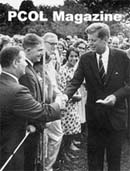
Peace Corps Online
...window on the world for RPCVs

Keeping Kennedy's Promise

RPCVs remember
...the Peace Corps Fallen
Peace Corps Online is an independent News Forum edited and published by Returned Peace Corps Volunteers and has no affilation or connection with the federal agency, the US Peace Corps.
All Rights Copyright © Peace Corps Online |
| |
 | Accountability
Read why Senator Norm Coleman is a strong supporter of Bush's full $359M budget request but wants greater accountability from the Peace Corps. |
 | The Fourth Goal
Sargent Shriver's Fourth Goal for the Peace Corps and his call for an enterprise that is vastly improved, expanded, and profoundly deeper. |
 | A Volunteer's Courage
After Sara Evans was assaulted she left the Peace Corps and returned to the United States. But her ordeal was only beginning. |
|





